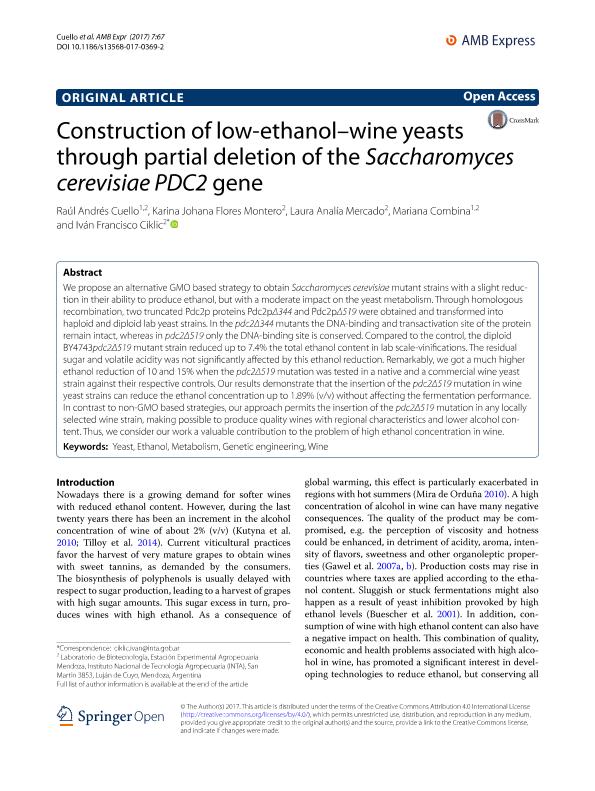Artículo
Construction of low-ethanol–wine yeasts through partial deletion of the Saccharomyces cerevisiae PDC2 gene
Cuello, Raúl Andrés ; Flores Montero, Karina Johana; Mercado, Laura Analia
; Flores Montero, Karina Johana; Mercado, Laura Analia ; Combina, Mariana
; Combina, Mariana ; Ciklic, Iván Francisco
; Ciklic, Iván Francisco
 ; Flores Montero, Karina Johana; Mercado, Laura Analia
; Flores Montero, Karina Johana; Mercado, Laura Analia ; Combina, Mariana
; Combina, Mariana ; Ciklic, Iván Francisco
; Ciklic, Iván Francisco
Fecha de publicación:
12/2017
Editorial:
Springer Verlag
Revista:
AMB Express
ISSN:
2191-0855
Idioma:
Inglés
Tipo de recurso:
Artículo publicado
Clasificación temática:
Resumen
We propose an alternative GMO based strategy to obtain Saccharomyces cerevisiae mutant strains with a slight reduction in their ability to produce ethanol, but with a moderate impact on the yeast metabolism. Through homologous recombination, two truncated Pdc2p proteins Pdc2pΔ344 and Pdc2pΔ519 were obtained and transformed into haploid and diploid lab yeast strains. In the pdc2Δ344 mutants the DNA-binding and transactivation site of the protein remain intact, whereas in pdc2Δ519 only the DNA-binding site is conserved. Compared to the control, the diploid BY4743pdc2Δ519 mutant strain reduced up to 7.4% the total ethanol content in lab scale-vinifications. The residual sugar and volatile acidity was not significantly affected by this ethanol reduction. Remarkably, we got a much higher ethanol reduction of 10 and 15% when the pdc2Δ519 mutation was tested in a native and a commercial wine yeast strain against their respective controls. Our results demonstrate that the insertion of the pdc2Δ519 mutation in wine yeast strains can reduce the ethanol concentration up to 1.89% (v/v) without affecting the fermentation performance. In contrast to non-GMO based strategies, our approach permits the insertion of the pdc2Δ519 mutation in any locally selected wine strain, making possible to produce quality wines with regional characteristics and lower alcohol content. Thus, we consider our work a valuable contribution to the problem of high ethanol concentration in wine.
Palabras clave:
Ethanol
,
Genetic Engineering
,
Metabolism
,
Wine
,
Yeast
Archivos asociados
Licencia
Identificadores
Colecciones
Articulos(CCT - MENDOZA)
Articulos de CTRO.CIENTIFICO TECNOL.CONICET - MENDOZA
Articulos de CTRO.CIENTIFICO TECNOL.CONICET - MENDOZA
Citación
Cuello, Raúl Andrés; Flores Montero, Karina Johana; Mercado, Laura Analia; Combina, Mariana; Ciklic, Iván Francisco; Construction of low-ethanol–wine yeasts through partial deletion of the Saccharomyces cerevisiae PDC2 gene; Springer Verlag; AMB Express; 7; 1; 12-2017; 1-11
Compartir
Altmétricas



